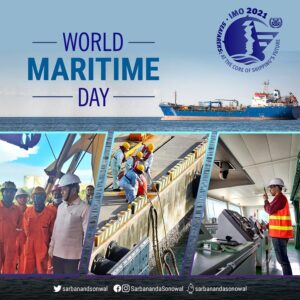The World Maritime Day is an annual celebration initiated by the United Nations (UN) in collaboration with the International Maritime Organisation (IMO). The day is set aside globally to celebrate the contributions of the maritime industry to the world’s economy.

Without international transportation of goods which is facilitated by those in the maritime industry, the world’s economy would be unable to function. This is a fact which is either overlooked by many or they are unaware of. The World Maritime Day is being organised to help address this issue.
The IMO has been responsible for choosing the World Maritime Day theme every year. So this year, it is drawing attention to the need to reduce carbon emission and embrace green shipping. The focus this year is: “New technology for greener shipping”.
Just like this year, the IMO in 2021 dwelt of seafarers with the theme – “Seafarers: At the Core of Shipping’s Future”
We also recall that in 2020, Nigeria had joined the rest of the world to celebrate the World Maritime Day, with the theme: “Sustainable Shipping for Sustainable Future”.
Remarkably, at the 2020 celebration some stakeholders claimed that the country had nothing to celebrate, owing to the myriads of challenges bedeviling her maritime sector.
They stated that Nigeria was far from thinking of the future and that Nigeria has remained where it is for failing to do what other nations have done.
They lamented that, when it comes to sustainable shipping, Nigeria is not there yet. According to some of them, every country has its own problem and our ability to face is what matters and I think the relevant agencies are putting in their best with the available resources they have, we may not be there yet, but we are on the path to the right place”.
Every year, stakeholders seem to always tilt towards using the day to highlight the plight of seafarers, apparently because the World Maritime Day celebration comes just about three months after the annual world seafarers’ day celebration.
In 2022, the focus of the Day of the Seafarer campaign highlighted the key role of seafarers in global shipping.
This week, again stakeholders, including government functionaries and chief executives will converge on Lagos to celebrate the day.
The theme for the year is “New technologies for greener shipping”. Already, notable agencies are putting finishing touches to what has become a ritual to Nigeria.
We are worried that Nigeria is yet to benefit from the ‘days’ that the maritime industry celebrates every year. These include the seafarers and the maritime day, among others.
These celebrations have become a ritual, providing opportunities to wine and dine, participate in talk shows and go back home, waiting for yet another year.
We are in agreement with those who postulate that as a maritime nation, we are far behind. We are in agreement because, if one looks at the various parameters and indices, it really doesn’t look quite good.
The questions are a legion: Where are our indigenous ships, why are our seafarers largely un employed or poorly remunerated, why is it that most seafarers trained in Nigeria can’t secure employment outside. Why is it that almost 18 years after it was enacted, the Cabotage Act has failed to impact significantly, why are Nigerian ship owners not patronized? Why is it that our ports are old-fashioned and largely manually- driven? Why is it that there is no port in Nigeria that enjoys a smooth access road?
And why is that the nation’s is still battling with the consequences of unsafe passage for incoming ships.
Issues bordering on the above concerns have been discussed yearly at these for a. Yet, we remain where we are.
We recall that at the 2021 celebrations, the then-Minister of Transportation, Rotimi Amaechi had challenged stakeholders on the need for a holistic evaluation of Nigeria’s maritime sector, noting that, “we are not where we ought to be”.
The theme in 2021 was: “Seafarers: At the Core of Shipping’s Future”. Amaechi then went ahead to yet assure that the ministry would continue to pursue policies and programmes that will make the maritime industry attractive to local and foreign investors and sustain the implementation of International Maritime Organisation instruments to ensure the safety, well-being and empowerment of seafarers.
Read Also: Do you think Nigeria qualifies to be called maritime nation?
Perhaps, the most pertinent question to ask is – are Nigerian seafarers closer to shipping future than they were in 2021? The answer is No.
“I urge you to holistically evaluate Nigeria’s maritime sector with a view to making useful suggestions that will consolidate the gains we have achieved so far. We are not where we ought to be as a nation, and will welcome constructive engagements for an improved maritime industry for Nigeria,” he had said.
Yes, at the forum in 2021, stakeholders who converged for the celebrations actually evaluated the nation’s maritime industry, they offered suggestions. But that was where it ended!
Perhaps, this year will be different, but we are deeply pessimistic. We do not foresee any difference. Just as they have always done, stakeholders will gather, they will talk around the theme for 2022, they will x-ray the issues, they will offer suggestions. And it will end there.
Kindly like us on Facebook/twitter















